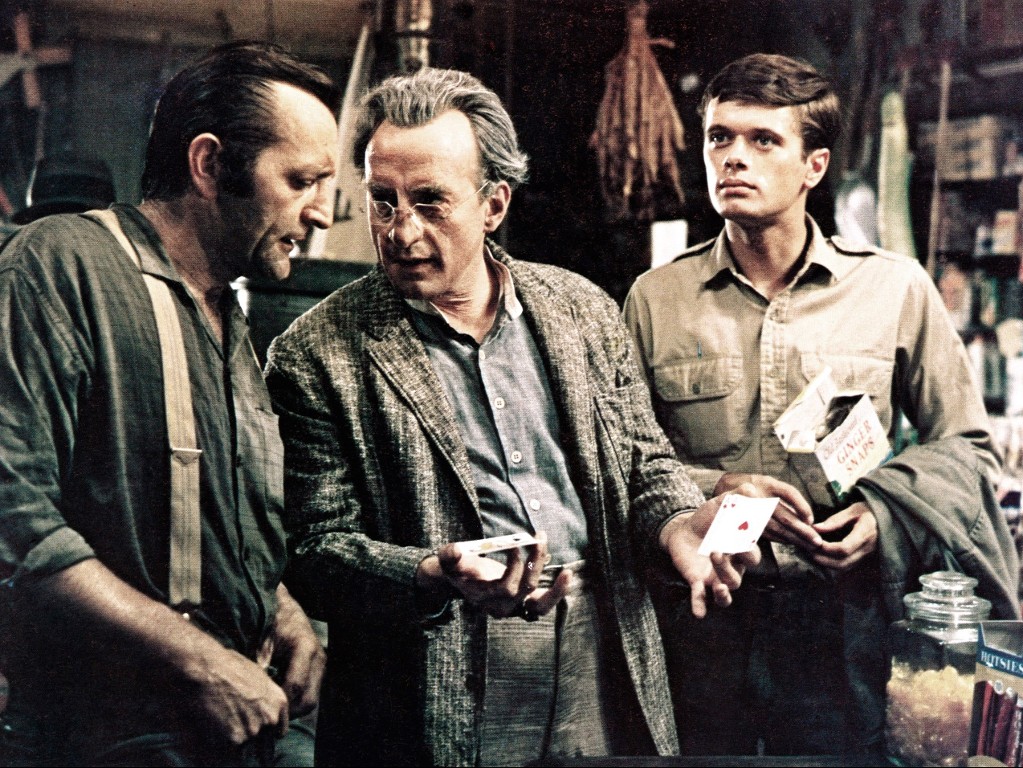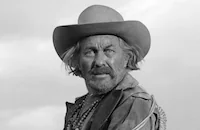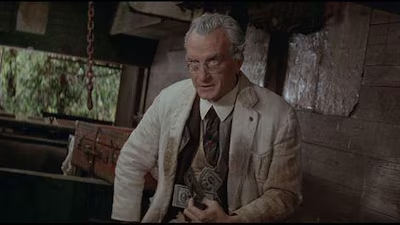The Flim-Flam Man

Brief Synopsis
Cast & Crew
Irvin Kershner
George C Scott
Sue Lyon
Harry Morgan
Jack Albertson
Alice Ghostley
Film Details
Technical Specs

Synopsis
Mordecai Jones is an old-fashioned confidence man equipped with a glib tongue and a heart of pure larceny. Widely known throughout the South as the Flim-Flam Man, he is always seen carrying the beat-up satchel that contains the tools of his trade: decks of playing cards, dominoes, punchboards, play money, etc. One day he meets Curley Treadaway, a Carolina farm boy who has gone AWOL from the Army after slugging his "big-mouthed Yankee sergeant." United by a common need to survive, the two renegades join forces once Mordecai has assuaged Curley's conscience by promising to cheat only other cheaters and the greedy. Following several successful swindles, they "borrow" a car from pretty Bonnie Lee Packard, a 17-year-old with whom Curley immediately falls in love. When the police spot the stolen car and the local sheriff gives chase, Mordecai races through the town, crashing into store windows, upsetting fruit trucks, and terrifying startled citizens. Having wrecked the car, they steal a truckload of moonshine whiskey which they quickly peddle for cash and supplies. Curley, meanwhile, has been having clandestine meetings with Bonnie, who lovingly urges him to become respectable. Eventually, despite his affection for Mordecai, Curley decides to give himself up to the Army; but before he can do so he and Mordecai are captured and jailed. Curley escapes, gets some dynamite boxes, and threatens to blow up the courthouse unless Mordecai is released. Trapped, the sheriff agrees. Once Mordecai has supposedly left town, Curley reveals that his threat was just another confidence trick--he never had any dynamite. As Curley is arrested, Bonnie and her influential father promise to see that he is treated fairly. Watching from the shadows is Mordecai, who has merely walked around the corner. "Thank you son," he murmurs and then he hops a freight train slowly moving out of town.

Director

Irvin Kershner
Cast

George C Scott

Sue Lyon

Harry Morgan

Jack Albertson
Alice Ghostley

Albert Salmi

Slim Pickens
Michael Sarrazin

Strother Martin
George Mitchell
Woodrow Parfrey
Jay Ose
Raymond Guth
Jesse L. Baker
Crew
L. B. Abbott
Yakima Canutt
Cinefx
Lewis Creber
Art Cruickshank
David Dockendorf
Margaret Donovan
Jerry Goldsmith
Dorothy Jeakins
William Kissel
Emil Kosa Jr.
Charles Lang
Arthur Morton
Peter Nelson
Phill Norman
Ben Nye
Joseph E. Rickards
William Rose
Walter M. Scott
Jack Martin Smith
Robert E. Smith
John Sturtevant
Robert Swink
Lawrence Turman
Josh Westmoreland

Videos
Movie Clip


Hosted Intro
Film Details
Technical Specs

Articles
The Flim-Flam Man
The Flim-Flam Man, a comedy about an irascible con artist working the small towns of the Deep South, was indeed different. Dr. Strangelove aside, Scott was known for his dramatic roles on the stage and on screen. He came to the film with Academy Awards nominations for his supporting roles in Anatomy of a Murder and The Hustler as well as two Emmy Award nominations to his credit. For The Flim-Flam Man the 39-year-old actor got the opportunity to play the 70-year-old Mordecai Jones, a legendary confidence man who works the small town rubes of the rural South. "I like him, he's a funny old duck," he told New York Times reporter Brian St. Pierre. "I play the part and get paid what it's worth--I hope. In return, I give it all I've got. I figure it's an even bargain."
"Introducing Michael Sarrazin," reads the credit of the young Canadian actor who plays Curley, the earnest army deserter who becomes Mordeecai's protégé and shill. It wasn't actually Sarrazin's debut--he'd appeared in a couple of low-budget films and a TV shows--but it was his first leading role and the film is built on his relationship with Scott's Mordecai and on the character's conflict between his sense of morality and his loyalty to the paternal swindler. Sue Lyon (who made a splash as Lolita) co-stars as the pretty daughter of one of their marks--romance immediately blooms, of course--and the supporting cast is filled with a solid line-up of reliable character actors and screen veterans, including Harry Morgan as the town sheriff, Albert Salmi as his slow-witted deputy, Jack Albertson and Alice Ghostley as Lyon's parents, and Slim Pickens and Strother Martin as easy marks for the veteran hustler.
The New York Times reporter Brian St. Pierre described director Irvin Kershner as "court jester, cheerleader and undisputed boss all at once, Gregory Ratoff sans paunch, Ichabod crane with humanity." That sensibility helps guide the raucous humor of the film. Jerry Goldsmith's score channels the Americana of Aaron Copland to set the sense of place, while a lazy harmonica establishes the comic, laid-back tone.
The film was shot on location in Kentucky over two and a half months. The production team set up their headquarters in Lexington and scouted locations in nearby small towns. The production was delayed when Scott injured his leg playing table tennis and he relied on crutches while it healed. For a few weeks, he was limited to scenes in which he could remain seated or standing upright without moving. Between shots, Scott played chess.
Scott was known for being aloof, friendly but distant from his fellow actors and members of the crew. While they stayed at a Lexington motel, Scott rented a thoroughbred horse ranch just out of town, and during the production he kept company with a small, tight entourage. But he was also a generous man. When a secretary working on the film was killed in a car accident, actor Jack Albertson took up a collection to pay for the funeral. According to Scott's longtime friend Del Acevedo, Scott told Albertson: "[S]end me the bill for the funeral and whatever you collect, give to the family to help them along."
Sources: Rage and Glory: The Volatile Life and Career of George C. Scott, David Sheward. Applause Theatre and Cinema Books, 2008.
"After The Bible, a Little Flim-Flam," Brian St. Pierre. The New York Times, November 13, 1966.
IMDb
By Sean Axmaker

The Flim-Flam Man
Quotes
Son, you'd be amazed at the hundreds of satisfied students I've matriculated over the last 50 years!- Mordecai Jones
Trivia
The Vaughn Tobacco Warehouses in Lexington, Kentucky were converted to soundstages for interior shooting of this film.
Notes
Location scenes filmed in Kentucky.

Miscellaneous Notes
Released in United States Summer July 1967
Released in United States Summer July 1967














